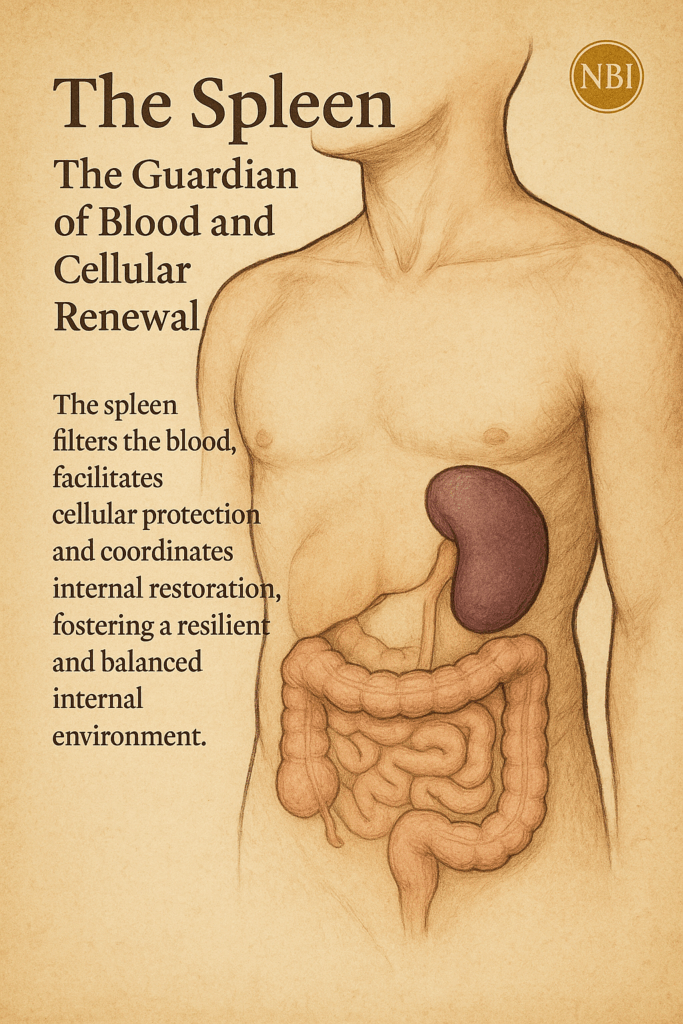The spleen is one of the most quietly powerful organs in the body. Resting beneath the left ribcage, it works every moment to cleanse the blood, recycle ageing cells, and support the body’s natural protective responses. Although it rarely receives much attention, the spleen plays a vital role in maintaining harmony within the internal terrain. In Natural Hygiene, the spleen is understood not as an “immune organ” but as a centre of blood renewal, filtration, and defence against internal stressors.
Every second, countless red blood cells reach the end of their life cycle. The spleen is responsible for gently removing these tired or damaged cells from the bloodstream, breaking them down, and returning their useful components back to the body. This process ensures that the blood remains vibrant, efficient, and capable of carrying oxygen with ease. The spleen also stores a small reserve of red blood cells and platelets, ready to be released instantly if the body requires additional support.
Beyond its role in blood renewal, the spleen helps the body recognise and respond to foreign material or internal disturbances. It inspects the passing blood and coordinates protective actions when needed. Instead of viewing this as “immunity,” Natural Hygiene sees it as the body’s innate capacity for defence, repair, and intelligent adaptation. The spleen is central to this quiet yet constant monitoring.
When the internal terrain is clean and well-nourished, the spleen functions effortlessly. It filters the blood with grace, supports the body’s protective activities, and coordinates renewal. But when the terrain becomes congested — through stagnation in the digestive tract, dehydration, overwork, emotional burden, or heavy foods — the spleen must work harder. Thickened blood, metabolic waste, and chronic stress can all place pressure on this delicate organ.
People may begin to notice subtle signs: a sense of fullness beneath the left ribs, fatigue, slower recovery from exertion, or a general feeling of heaviness. Some experience swollen lymph nodes, a tight upper abdomen, or patterns of frequent sensations of “coming down with something.” These are not signs that the body is breaking down, but signals that the spleen is working harder than it should, asking for rest, hydration, and simplicity.
Emotionally, the spleen is sensitive to thought and tension. Traditional health systems long observed a link between the spleen and worry, overthinking, or persistent mental strain. When the mind is overloaded, the body tends to hold tension in the upper abdomen, reducing circulation around the spleen. Over time, this can dull energy and create a feeling of internal pressure. A calmer emotional landscape, lighter thoughts, grounding practices, and allowing space for stillness directly support the spleen’s natural equilibrium.
Natural Hygiene teaches that nothing benefits the spleen more than a clean, fluid terrain. Water-rich fruits, leafy greens, and simple meals reduce the metabolic load on the bloodstream, allowing the spleen to focus on renewal rather than constant filtration. Heavy fats, processed foods, and animal products tend to thicken the blood and slow the spleen’s efficiency.
Fasting provides one of the most profound opportunities for the spleen to reset. When digestion pauses, the bloodstream begins to clear. Old cells are recycled more efficiently, inflammation reduces, and the spleen shifts from constant processing to deeper restoration. Many people describe feeling clearer, lighter, and more vibrant during and after fasting, as the spleen has finally been given the conditions it needs to perform its deeper work.
Movement and breath also play a powerful role in spleen health. Gentle walking, stretching, twisting movements, and diaphragmatic breathing all increase circulation in the upper abdominal region, encouraging renewal within the spleen. Sunshine activates processes in the blood that indirectly support the spleen’s cleansing actions. Rest — especially early nights and deep sleep — gives the body time to carry out the repair processes that the spleen oversees.
As the terrain becomes lighter, cleaner, and calmer, the spleen returns to its natural elegance. Energy stabilises. The body feels stronger and more resilient. The sense of heaviness or congestion fades. People often notice clearer thinking, a more grounded emotional state, and fewer episodes of internal disturbance. This is the spleen stepping back into harmony, no longer burdened by an overloaded terrain.
The spleen teaches us the power of quiet guardianship. It reminds us that the body’s protective and renewing capabilities are innate and work best when conditions are simple, clean, and calm. By honouring the natural laws of health — hydration, clean food, fresh air, movement, rest, and emotional clarity — we allow the spleen to serve as the steadfast guardian it was designed to be.
The spleen is more than a filter. It is a master of blood renewal, a coordinator of the body’s protective responses, and a symbol of resilience. When we nurture it, we strengthen the foundation of our entire internal ecosystem.
How This System Communicates Stress
- Fatigue and exhaustion
- Circulatory and sensory sensations
- Pain, stiffness and inflammation
- Digestive discomfort
- Emotional and nervous tension

